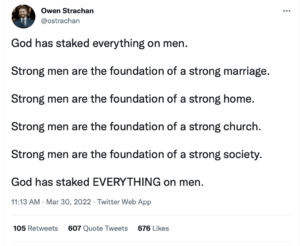If you want to understand how extreme the male-dominance wing of the Southern Baptist Convention has become, consider this March 30 social media post from Owen Strachan:
“God has staked everything on men. Strong men are the foundation of a strong marriage. Strong men are the foundation of a strong home. Strong men are the foundation of a strong church. Strong men are the foundation of a strong society. God has staked EVERYTHING on men.”
 Strachan is a former professor at an SBC seminary who now teaches at a Reformed seminary. He also is former head of the Council on Biblical Manhood and Womanhood, an organization heavily populated by and led by Southern Baptist complementarians and Calvinists. He remains an influential person among the right-most flank of the SBC.
Strachan is a former professor at an SBC seminary who now teaches at a Reformed seminary. He also is former head of the Council on Biblical Manhood and Womanhood, an organization heavily populated by and led by Southern Baptist complementarians and Calvinists. He remains an influential person among the right-most flank of the SBC.
Complementarianism is the belief that God created men and women in different ways so that they are suitable for different roles in the church and home. This belief system always teaches male dominance and female subordination — but with varying degrees of extremity. Strachan represents the extreme side of the complementarians.
To say this tweet caused a kerfuffle on Twitter would be an understatement. Women and men alike picked it apart and expressed disbelief. Even other complementarians blushed.
One woman asked: “Does Owen Strachan have a mother?”
Another replied: “Owen, you forgot that Jesus didn’t count on the men at his resurrection. Instead, Jesus told a woman. Owen, Jesus staked EVERYTHING on a woman.”
The Council on Biblical Manhood and Womanhood
Although Strachan no longer teaches at an SBC seminary, his theology of extreme male dominance is not disconnected from the SBC. One of the key bridging points is the Council on Biblical Manhood and Womanhood.
The name of the organization alone should raise alarm because of its assumption there is one agreed-upon version of “biblical manhood” and “biblical womanhood.”
The organization’s website explains that it was formed in 1987 “primarily to help the church defend against the accommodation of secular feminism. At this time many evangelicals were beginning to experiment with an ideology that would later become known as evangelical feminism. This was a significant departure from what the church had practiced from its beginning regarding the role of men and women in the home and local church.”
The group says feminism threatens the authority of Scripture, the health of the home, the health of the church, the role of worship, Bible translations, and the advance of the gospel.
The website further warns: “The effects of this departure have not been benign. As evangelical feminism continues to spread, the evangelical community needs to be aware that this debate reaches ultimately to the heart of the gospel.”
The group says feminism threatens the authority of Scripture, the health of the home, the health of the church, the role of worship, Bible translations, and the advance of the gospel.
In other words, pretty much “everything” is at stake in the fight against feminism and “evangelical feminism.”
The Danvers Statement
In response to this perceived threat, the Council in 1987 adopted the Danvers Statement, which lays out its core convictions, including the belief that “Adam’s headship in marriage was established by God before the Fall, and was not a result of sin.”
The Danvers Statement also explains: “In the family, husbands should forsake harsh or selfish leadership and grow in love and care for their wives; wives should forsake resistance to their husbands’ authority and grow in willing, joyful submission to their husbands’ leadership.”
With later widespread cultural acceptance of same-sex relationships, the Danvers Statement no longer was deemed sufficient, so the group in 2017 drafted the Nashville Statement as a follow-up. That statement also emphasizes strict gender role, as well as strict sexual morality.
The Council’s vision is “to see the vast majority of evangelical homes, churches, academic institutions, and other ministries adopt the principles of the Danvers Statement and the Nashville Statement as a part of their personal convictions and doctrinal confessions and apply them in consistent, heart-felt practice.”
That has indeed come to pass, with multiple SBC seminaries among the institutions that now require faculty and students to affirm both the Danvers Statement and the Nashville Statement.
Influence on the SBC
By 1998, the complementarian views of the Council made their way into the SBC’s own doctrinal statement, the Baptist Faith and Message. A new section on “The Family” was added to state, in part: “A wife is to submit herself graciously to the servant leadership of her husband even as the church willingly submits to the headship of Christ. She, being in the image of God as is her husband and thus equal to him, has the God-given responsibility to respect her husband and to serve as his helper in managing the household and nurturing the next generation.”
By 1998, the complementarian views of the Council made their way into the SBC’s own doctrinal statement, the Baptist Faith and Message.
That was perhaps less shocking than the non-binding resolution the SBC adopted 14 years earlier, in 1984, opposing women’s ordination, in part to “preserve a submission God requires because the man was first in creation and the woman was first in the Edenic fall.”
But the change to the SBC’s faith statement had ripple effects throughout the denomination because unlike convention resolutions, the faith statement often is used to enforce doctrinal conformity.
Thirty-eight years after declaring that Eve caused Adam to sin in the Garden of Eden, the SBC is more tightly connected to complementarianism now than ever.
Southern Baptist academics and pastors continue to be dominant in leadership with the Council on Biblical Manhood and Womanhood. The group’s current president is Denny Burk, professor of biblical studies at Boyce College, the undergraduate unit of Southern Baptist Theological Seminary. The group’s journal, called Eikon, is edited by Andrew Walker, associate professor of Christian ethics and apologetics at Southern Seminary.
The group’s seven board members — all male — include three faculty members at SBC seminaries: Burk, along with Danny Akin, president of Southeastern Baptist Theological Seminary; and Jason Duesing, provost and associate professor of historical theology at Midwestern Baptist Theological Seminary.
The group’s 29-member council — which includes five women — also lists 10 SBC seminary employees: Akin; Jason Allen, president of Midwestern Baptist Theological Seminary; Burk; Duesing; Jim Hamilton, professor of biblical theology at Southern Seminary; Daniel Heimbach, senior professor of Christian ethics at Southeastern Seminary; Mary Kassian, professor at Southern Seminary; Margaret Kostenberger, associate professor of theology and women’s ministry at Midwestern Seminary; Al Mohler, president of Southern Seminary; and Bruce Ware, professor of Christian theology at Southern Seminary.
Complementarianism and Calvinism
The rise of complementarianism in the SBC coincides with the rebirth of Calvinism in the SBC. The two themes are inextricably linked.
Before Mohler ascended to the presidency of Southern Seminary in 1993, Calvinism was little noticed in the SBC, which in modern times has been known for revivalistic evangelism. In simple terms, Calvinism — also known as Reformed theology — teaches that all humans are born as sinners living in total depravity but that the irresistible grace of God will bring to salvation all the elect whom God has preordained to be saved. That also means those not among the elect are destined for a fiery literal hell and have no chance of being saved. These beliefs are commonly known among Calvinists as “doctrines of grace.”
“The rise of complementarianism in the SBC coincides with the rebirth of Calvinism in the SBC.”
While it is true that one branch of the earliest Southern Baptists were Calvinists, not all were Calvinists. And over time, the SBC became more and more in tune with the “whosoever will may come” theology of revivalism. The SBC’s entire missions enterprise was built on the premise of Scripture that “all who call upon the name of the Lord will be saved.”
After taking the helm at Southern Seminary, Mohler quickly became the best-known neo-Calvinist in the SBC and began a movement to gather up other like-minded professors and students. For about a decade, this caused frequent verbal sparring between the non-Calvinist leaders of the so-called “conservative resurgence” in the SBC and the ascendant Calvinists.
Lesser noticed, however, was Mohler’s effort to lend credibility to complementarian theology. The belief that men and women are divinely ordained to different roles in the church may not have been new to the SBC, but the more extreme statement of that embodied by the Council on Biblical Manhood and Womanhood was at the time a fringe movement.
When the Baptist Faith and Message was revised in 1998 to include a section on “The Family,” that was recommended by an eight-member task force that included Mary Mohler, wife of Al Mohler. She was listed in the report as “homemaker and director of the Seminary Wives Institute of The Southern Baptist Theological Seminary.”
The Seminary Wives Institute was a new creation of the Mohler administration to teach wives of male seminary students — female students were no longer training to be pastors alongside men — how to be good homemakers and obedient wives.
Just two years later, Al Mohler would serve on another committee that thoroughly revised the Baptist Faith and Message statement. Those revisions were the last straw for many moderate and progressive Southern Baptists who then formalized their departure from the SBC.
“Perhaps the best answer is that both theologies depend on an absolute certainty about a single way to interpret Scripture.”
Why there is such a clear relationship between the SBC’s brand of Calvinism and complementarianism is another question. Perhaps the best answer is that both theologies depend on an absolute certainty about a single way to interpret Scripture. And both theologies are reacting against modernity — which includes advances in women’s rights and leadership opportunities.
Running against the tide
Just as all Southern Baptists are not Calvinists, not all Southern Baptists are complementarians. However, two things appear to be true: More Southern Baptists are complementarians than are Calvinists, but virtually all Southern Baptist Calvinists are complementarians.
The embrace of complementarianism is evident in the SBC’s doctrinal statements, annual convention resolutions and statements by denominational leaders. The convention is on record opposing women serving as pastors, even though the largest church in the SBC — Saddleback Church in Southern California — last year ordained three women as pastors.
While the SBC — along with other highly conservative Protestant denominations — has taken an increasingly more vocal embrace of complementarianism, the national mood has gone the other way. A 2020 survey by Pew Research found this: “Many of the values of the feminist movement have been accepted across the political spectrum in the United States, even among Americans who don’t personally identify as feminists.”
Similar findings were reported by Gallup in 2020.
A 2017 poll by the evangelical firm Barna Research found 79% of Americans would be accepting of a female clergyperson leading their churches. Even among evangelicals, 39% said they would approve.
A second wave of separation
In the 1980s and 1990s, the role of women in the church and home became a flashpoint in the schism between SBC moderates and conservatives. As the SBC turned increasingly more conservative, supporters of gender equality — and especially of women in ministry — were among the first out the door.
Some female clergy left for the greener pastures of the United Methodist Church, the United Church of Christ, the Disciples of Christ, the Episcopal Church. Others took refuge in the newly formed Alliance of Baptists and the later-formed Cooperative Baptist Fellowship.
30 years later, a second wave of departures over complementarianism arose.
Then 30 years later, a second wave of departures over complementarianism arose, most notably with the departure from the SBC of popular Bible teacher Beth Moore, who now attends an Anglican Church and has apologized for enabling complementarianism.
And with a new wave of scholarly research arguing a biblical case for gender equality — Beth Allison Barr’s The Making of Biblical Womanhood and Kristin Du Mez’s Jesus and John Wayne, for example — it is the SBC complementarians who are leading the charge to discredit them. Denny Burke and Owen Strachan are front and center in this debate.
In response to Strachan’s tweet about God staking everything on men, Barr had this to say via Twitter: “I’ve really decided he must be a caricature. Surely he doesn’t really think this is accurate (I know he has academic & theological training). Would someone please give him a copy of #MakingBiblicalWomanhood?”
If God has indeed “staked everything on men,” it seems a lot of women aren’t getting the message.
Related articles:
Debate over women in Southern Baptist pulpits flares on social media
Council on Biblical Manhood and Womanhood announces leadership change
This is a tale of testicles, fertility, the length of men’s hair, and one bizarre tweet | Analysis by Rick Pidcock
For Godself’s sake, stop picking on the small church where Beth Allison Barr’s husband serves as pastor | Opinion by Mark Wingfield
Now Beth Moore is taking on patriarchy in the church
The year of being threatened by smart women | Analysis by Mark Wingfield


